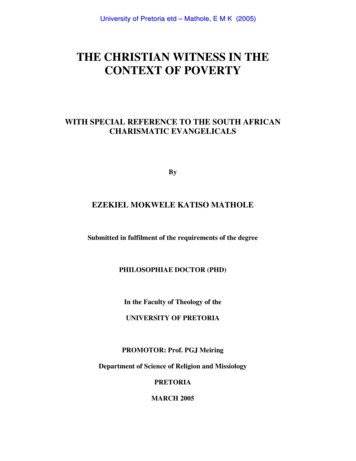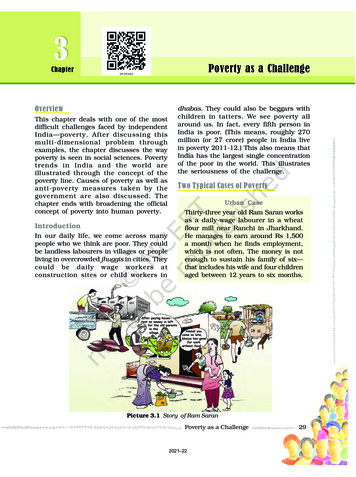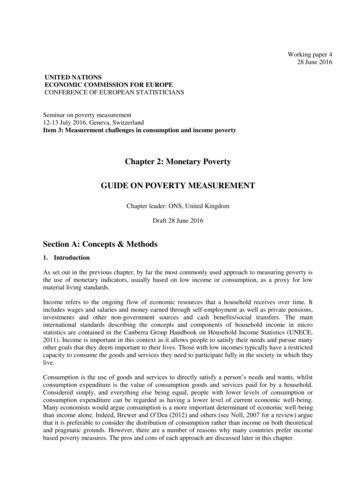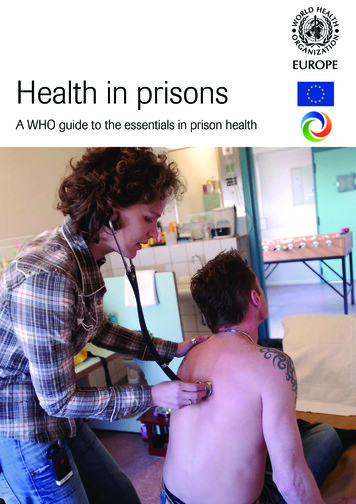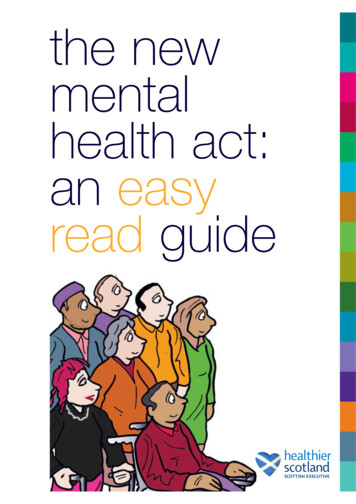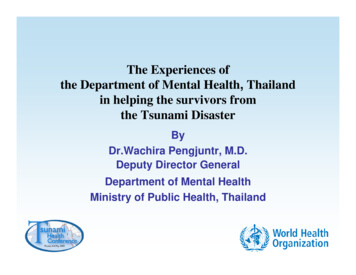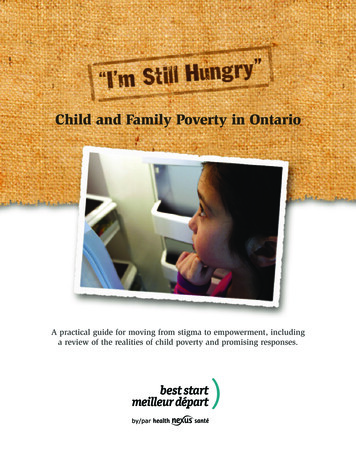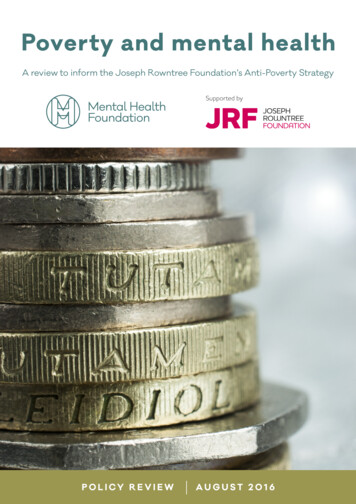
Transcription
Poverty and mental healthA review to inform the Joseph Rowntree Foundation’s Anti-Poverty StrategyP O L I CY R E V I E W1AUGUST 2016
Poverty and Mental Health:A review to inform the Joseph Rowntree Foundation’s Anti-Poverty StrategyIris Elliott PhD FRSAAugust 2016CitationThe recommended citation for this review is:Elliott, I. (June 2016) Poverty and Mental Health: A review to inform theJoseph Rowntree Foundation’s Anti-Poverty Strategy. London: MentalHealth Foundation.AcknowledgementsHelen Barnard managed the delivery of the review for the JosephRowntree Foundation and co-ordinated input from her colleagues.Professor David Pilgrim, University of Liverpool; Professor David Kingdon,University of Southampton; Andy Bell, Centre for Mental Health; and SamCallan, Centre for Social Justice were insightful reviewers.Thank you to the Mental Health Foundation team who supported thewriting of this report: Isabella Goldie, Director of Development andDelivery; Marguerite Regan, Policy Manager; and Laura Bernal, PolicyOfficer.2
ContentsExecutive Summary .41. Introduction .72. Poverty and Mental Health: A Conceptual Framework.153. Poverty and Mental Health Across the Life Course .224. Public Services .324.1 Cross-Cutting Themes.334.2 Health.364.3 Social Care.444.4 Education.454.5 Employment.504.6 Social Security.544.7 Advice.604.8 Planning the Built Environment.635. Growing the Evidence Base: Data and Research .656. Costings .687. Recommendations .788. Methodology .83Bibliography .88Glossary .963
Executive Summarydiscrimination; and policy development)at different stages of life and across thewhole of the life course. Attention isgiven to pressure points and transitionsthroughout life, particularly whenthese are adverse experiences such ashomelessness, redundancy and familybreakdown, which can be traumatic andhave cumulative impacts. People withcomplex needs are discussed across thereview.Poverty increases the risk of mentalhealth problems and can be both acausal factor and a consequence ofmental ill health. Mental health is shapedby the wide-ranging characteristics(including inequalities) of the social,economic and physical environmentsin which people live. Successfullysupporting the mental health andwellbeing of people living in poverty,and reducing the number of people withmental health problems experiencingpoverty, require engagement with thiscomplexity.In order to strengthen the evidence base,mental health must be addressed withinpoverty data and research, and, likewise,poverty addressed within mental healthdata and research. A mental health andpoverty research agenda should beco-produced with individuals, familiesand communities with lived experienceof these issues. This research agendashould include economic research thathas proved persuasive in key areas suchas maternal mental health (see Costingssection 6). Implementation sciencemethodologies should be employedto scale and test programmes andinterventions in order to ensure that theyare appropriate and effective for peopleliving in poverty.The review presents a conceptualframework for understanding therelationship between poverty andmental health, which draws together:a life course analysis; a discussion ofthe socio-economic factors (or socialdeterminants) impacting mental healthand poverty; the principles of humanrights, equity, anti-stigma and nondiscrimination; and the approachesof prevention, self-management, peersupport, community development andsocial movement building.There are a number of imminentopportunities for addressing mentalhealth and poverty across the UK,including the programmes forgovernment of the recently electeddevolved administrations in Scotland,Wales and Northern Ireland.The review recognises the corrosiveimpact of stigma and discriminationon people experiencing mental healthproblems and those living in poverty.It proposes the integration of socialcontact approaches around mentalhealth and poverty within current antistigma campaigns and initiatives.Recommendations for action aremade across a number of cross-cuttingareas (data and research; stigma and4
The development of Mental Health inAll Policies (MHiAP) at national and localgovernment levels is recommendedfor areas of public policy consideredwithin this review (health, education,employment, social security, advice andplanning the built environment), notingthat this is not an exhaustive list.treatment for claimants with mentalhealth problems across the socialsecurity system. At a minimum, the WorkProgramme needs to be completelyoverhauled.In later life, the evidence base foreffective interventions needs to befurther developed, particularly forinitiatives that facilitate social andcultural participation, enhance socialconnection and reduce isolation. Thecommissioning of systematic reviews ofevidence would be a valuable first stepin identifying what works with regardsto addressing mental health and povertyin later life. Primary care screening formental health problems (particularlydepression and dementia) is one way topromote early intervention.The life course stages are framed withinthis report as: perinatal (pregnancy andthe first year following birth), early years,children and young people; working age;and later life (from 50 years onwards).It is essential that the National Institutefor Health and Care Excellence (NICE)perinatal care pathway is implementedacross the UK. Recommended supportsfor families, children and young peopleare the Family Nurse Partnership,evidence-based positive parentingprogrammes (including for familieswith a parent who has mental healthproblems), the adoption of the wholeschool approach, and particular supportsfor vulnerable and excluded children,many of whom may not be in education.People experiencing poverty andmental health problems would benefitfrom a number of initiatives across thelife course. The creation of accessible,integrated public service hubs withindeprived communities would provideindividuals, families and groups withtimely, appropriate and local support andcare. A national programme of primarycare-based social prescribing withinthese communities would facilitatepeople’s access to mental health,enhancing social, cultural and leisureactivities that are beyond their economicreach.During working age, policy shouldsupport people to enter and remain inwork through the adoption of wholeworkplace approaches, a nationalindividual placement and support (IPS)programme, and development of mentalhealth and wellbeing programmes forsmall and medium-sized enterprise(SME) owner-managers and employees.The social security system needs to beleveraged to ensure that claimants withmental health problems receive theirfull social security entitlements, andare the beneficiaries of programmessuch as Access to Work. There needsto be an improvement in the quality ofMental health problems can disruptpeople’s education, training and entryinto, and progression within, work. Localopportunities for lifelong learning arean important way of addressing thedisadvantage and exclusion that thisleads to.5
The Psychologically Informed PlannedEnvironments (PIPEs) approach hasbeen piloted within some criminaljustice settings. PIPEs are a form ofPsychologically Informed Environment(PIE). The evidence base is developingbut promising, and the reportrecommends the scaling and testing ofPIEs in services for people with complexneeds.The use of parity within policy advocacyin order to advance fair investmentin mental health has magnified thefalse dichotomy between mental andphysical health. Addressing the mentalhealth of children and adults withlong-term physical health conditionsimproves their engagement with careand treatment, and their prognosis, aswell as their family members’ and carers’mental health and wellbeing. Tacklingthe high levels of physical ill health andearly death among people with seriousmental health problems is a priority. Thedevelopment of integrated pathwaysacross the life course for peoplewith co- and multiple morbidities isrecommended.This review has synthesised evidenceacross a considerable breadth ofpublic policy agendas. Although it isnot a systematic review, the evidencehas come from authoritative sources.Where the evidence base is developingbut promising, this is noted (seeMethodology).Concerns about the relationshipbetween mental health and criminaljustice have been raised over manyyears, each successive report buildingthe case for a complete health andjustice pathway. This report recommendsthe development of such a pathway,improved mental health provisionacross all criminal justice settings, anda comprehensive national liaison anddiversion programme. The needs ofBlack, Asian and Minority Ethnic (BAME)community members, women, and olderoffenders require particular attentionwithin this work.It is intended that the review is relevantto policy, provision and people acrossthe UK. The type, quality and scopeof statistical information and otherevidence about mental health andpoverty varies across the UK. Thesevariations are noted, but the review’snarrative and recommendations havebeen written to be as relevant to eachpart of the UK as possible.6
1. IntroductionOne in four adults and one in tenchildren experience mental healthproblems to some degree in any year;iand the impacts of mental healthproblems ripple out to affect many morepeople through their social networks offamily, education, work and community.The 2015 ‘Monitoring Poverty andSocial Exclusion’ report’s comparisonof data between 2005 and 2012 foundthat a greater proportion of womenwere assessed as being at high risk ofmental health problems compared tomen; within the lowest social economicclass, 26% of women and 23% of menwere at high risk of mental healthproblems.ii Three-quarters of peoplewith a mental health problem do notreceive ongoing treatment.iii Poverty1increases the risk of mental healthproblems, and can be both a causalfactor and a consequence of mental illhealth.iv Mental health is shaped by thewide-ranging characteristics (includinginequalities) of the social, economicand physical environments in whichpeople live.v Successfully supporting themental health and wellbeing of peopleliving in poverty and reducing thenumbers of people with mental healthproblems experiencing poverty requiresengagement with this complexity.There is a growing UK policy consensusthat mental health requires substantialattention and investment in orderto address the huge economic andsocial costs to individuals, families,communities and society. This agendaencompasses addressing the range ofsocial and economic factors that affectmental health (referred to as the ‘socialdeterminants of health’), challenging thestigma and discrimination that continueto impact people with mental healthproblems and their families in all areasof their lives, removing barriers to fullparticipation within society – includingin education, employment and thecommunity – providing public servicesin a timely manner, and developingresearch and data in order to ensure thatpolicy and provision are evidence based,and that progress is tracked.2,viThe Joseph Rowntree Foundation’s definition of poverty is: “When a person’s resources (mainly theirmaterial resources) are not sufficient to meet their minimum needs (including social finition-poverty1The Mental Health Foundation’s UK public inquiry into the future of mental health services (December2012–September 2013) synthesised evidence from twelve oral evidence sessions held across theUK, 1,533 submissions to its call for evidence, three individual interviews, four background papers(‘Inequalities and Mental Health’; ‘A Brief History of Specialist Mental Health Services’; ‘HealthcareInformatics for Mental Health: Recent advances and the outlook for the future’; and ‘Mental HealthProfessional Education and Training in the UK’), and an expert seminar.27
Although mental health problems canaffect anyone at any time, they are notequally distributed and prevalencevaries across social groups. The ChiefMedical Officer for England identifieda number of groups of young people asbeing at risk of developing mental healthproblems, including children living at asocio-economic disadvantage, childrenwith parents who have mental healthor substance misuse problems, andlooked-after children. Among adults, sheidentified higher risk among people whohave been homeless, adults with a historyof violence or abuse, Travellers, asylumseekers and refugees, and isolated olderpeople.3 Higher rates of mental healthproblems are associated with povertyand socio-economic disadvantage.Social characteristics, such as gender,disability, age, race and ethnicity, sexualorientation and family status influencethe rates and presentation of mentalhealth problems, and access to supportand services.policy and services. Such complexneeds in adulthood can originate in‘complex trauma’ – that is, exposureto traumatising events from an earlyage that lead to complex symptomsand behaviours.vii Complex traumacan affect people’s ability to formtrusting relationships and emotionalmanagement;viii but, if addressed,recovery is possible.ix Trauma-informedcare (TIC) has been described as:People who experience several complexand interrelated issues, who are referredto as having ‘complex needs’, are athigher risk of mental health problemsand require tailored responses withinThe experience of homelessnessillustrates the relationship betweencomplex trauma and consequentcomplex needs. People experiencinghomelessness, particularly single“an over-arching framework thatemphasizes the impact of trauma andthat guides the general organisationand behavior of an entire system.Trauma-Specific Services may beoffered within a trauma-informedprogram or as stand-alone services”.Different approaches to TIC have anumber of common characteristics:trauma awareness, an emphasis onsafety, opportunities to rebuild controland a strengths-based approach.xIn her 2013 annual report themed on public mental health, England’s Chief Medical Officer identifiedparticular groups of young people at risk of developing mental health problems: children living at asocio-economic disadvantage; children with parents who have mental health or substance misuseproblems; children experiencing personal abuse or witnessing domestic violence; looked-afterchildren; children excluded from school; teen parents; young offenders; young lesbian, gay, bisexual ortransgender (LGBT) people; and young black and minority ethnic people. The groups of adults who havehigher vulnerabilities to experiencing mental health problems were listed as: people with past mentalhealth problems; people who have been homeless; adults with a history of violence or abuse; adults whomisuse alcohol or other substances; offenders and ex-offenders; LGBT adults; Travellers, asylum seekersand refugees; adults with a history of being looked after or adopted; people with learning disabilities;isolated older people; and people from BAME communities.38
1.1 The Impact of the Financial andEconomic Crisispeople4 and women,5 have high levelsof mental health problems. High levelsof histories of neglect, abuse andtraumatic childhood experiences werefound in a 2011 census survey of 1,286participants living in urban homelessnesscommunities.xi Additionally, people whoare homeless may experience significantsocial exclusion and be affected bysubstance misuse, which, in themselves,can be traumatic experiences.xii Allof these experiences and issues arefurther associated with involvement inthe criminal justice system. Promisingapproaches to addressing complextrauma include the development of PIEswithin services used by people withcomplex needs (discussed in section4.1.4).xiiiThe global financial and economic crisishas accentuated and reinforced longterm trends in inequality, low pay andrelated poverty in Europe. While theinitial impact was high rates of maleredundancy, women have experiencedhigher wage cuts. Disabled people(including people with mental healthproblems), women and ethnic minoritieshave experienced disproportionatelynegative impacts.xvThe primary health impacts of economicdownturns are on mental health(including the risk of suicide).xvi Peoplewith no previous history of mentalhealth problems may develop them as aconsequence of having to cope with theongoing stress of job insecurity, suddenand unexpected redundancy, and theimpacts of loss of employment (financial,social and psychological). Keepingpeople with mental health problems inwork and getting people back to workare key policy and service responses tothe economic downturn.xviiPoverty produces an environment thatis extremely harmful to individuals’,families’ and communities’ mentalhealth. The impacts of poverty arepresent throughout the life course(before birth and into older age) andhave cumulative impacts. However,there are evidence-based measures toprogress mental health promotion, illhealth prevention, early intervention,and care and treatment that leadto resilience and recovery and canbe delivered at individual, family,community and national levels.xivA review of UK and internationalliterature, and two Welsh localauthority case studies by the Cardiff‘Single homeless people’ is generally understood to be those who are homeless but do not meet thepriority needed to be housed by their local authority. They may live in supported accommodation –such as hostels and semi-independent housing projects – sleep rough, sofa surf or live in squats. Manyhave significant support needs (St Mungo’s (2014) in Breedvelt (February 2016)).4Women represent around 30% of people using homelessness accommodation. Women, in particular,may have experienced complex trauma and be further subjected to this through sexual and domesticviolence, separation from children, relationship breakdowns, and bereavement. They can benefit froma different – that is, gender-sensitive – approach to meeting their complex needs. (Hutchinson et al.(2014) in Breedvelt (February 2016))59
2009 commented: “there is likely to bea long tail of human suffering followingthe downturn”.xxi Longitudinal researchis required to understand the long-termimpacts of the financial and economiccrisis within the UK, both acrossgeographical areas and within populationgroups. In Northern Ireland, suchresearch should consider the impacts ofboth the UK and Irish recessions.Institute of Society and Health andthe Wales Health Impact SupportUnit, found that the health impacts ofrecession and its aftermath are likelyto be felt directly through uncertainty,insecurity and lack of control. Withinthe labour market, these impactsinclude anticipation of redundancy,unemployment, underemployment,changes in expectations of productivityand working practice, reductions inincome, experiences of debt, financialtension, and relationship strain. Studiesabout the rapid de-industrialisation inthe UK during the 1980s (in Wales, andin the West Midlands and North Eastof England) found that, although livingin areas of high unemployment mayprotect against some psychologicalimpacts of unemployment (such asstigma and shame), in the long term,people living in these communities areexposed to other mental health risksassociated with economically deprivedareas.xviii The impacts of recessionon such communities highlight howdisadvantage accumulates within places– for example, the loss of communityresources and facilities when the localeconomy cannot sustain them, and theerosion of social capital due to weakenedsocial networks and reduced socialinteraction.xix1.2 Policy OpportunitiesAfter many years of advocacy, mentalhealth is receiving significant attentionfrom policy-makers across the UK, inEurope and globally. Milestone reportsinclude the national Foresight reporton mental capitalxxii and the WorldHealth Organization’s (WHO’s) seriesof reports: ‘Mental Health, Resilienceand Inequalities’,xxiii ‘Mental HealthAction Plan 2013–2020’,xxiv ‘SocialDeterminants of Mental Health’xxv and‘ROAMER: A Roadmap for MentalHealth and Wellbeing Research inEurope’ (ROAMER).xxvi This valuablebody of policy and research reportsis coalescing around a common,evidence-based agenda across the lifecourse, combining, firstly, public mentalhealth through addressing the socialdeterminants of mental health andadvocating a proportionate universalistapproach in order to reduce healthinequalities, and, secondly, integratedmental health and social care servicesthat are focused on early interventionand characterised by access, choice,quality and timeliness.As signs of recovery emerge withinthe UK, it is important to distinguishbetween economic recession, which maybe of a relatively short duration, and theconsequences that can negatively affectparticular people and places over alonger period of time, depending on theinteraction of social class, age, genderand the type of work that has been lost.xxResearchers who looked into the suiciderates in Europe between 2007 andFor decades, mental health campaignershave drawn attention to the historicalunderinvestment and marginalisation ofmental health in public policy, service10
Finally, this advocacy is securingsignificant policy (if not substantialbudgetary) successes. In England, thereare policy commitments to parity ofinvestment in the ‘No health withoutmental health’ national policy, the NHSMandate, the NHS ‘Five Year ForwardView’ (2015–2020), the Children andYoung People’s Taskforce’s ‘Future inMind’ 2015 report, and the independentMental Health Taskforce establishedby NHS England (NHSE), whichreported in February 2016. The publicand private sectors are recognisingthat the economic and social costs ofunderinvesting in mental health are notsustainable.provision, research and data. Mentalhealth problems are the largest singlesource of disability in the UK, accountingfor 23% of the total ‘burden of disease’(a composite measure of mortality andreduced quality of life).xxvii However,it is difficult to get a comprehensiveunderstanding of mental health,including mental health and poverty,due to inadequate research and data.A recent briefing by The King’s Fundcommented on the challenges ofreporting reliable data on the levels offunding for mental health services inEngland, and that, consequently, thequality of services cannot be definitelyassessed;xxviii this is a challenge acrossthe UK.xxix With regards to research,mental health receives only 5.5% of thehealth research budget (this is discussedfurther in section 5).xxxThis report is a timely contribution thatcan inform the ongoing developmentof public policy for the WestminsterGovernment and the devolvedadministrations of Scotland, Wales andNorthern Ireland elected in May 2016.In England, it will be important for theJoseph Rowntree Foundation’s (JRF’s)Anti-Poverty Strategy to inform theimplementation of national mentalhealth policy and the Mental HealthTaskforce’s report, ‘The Five YearForward View for Mental Health’, and tosupport the Prevention Concordat andproposed mentally healthy communitiesagenda, including Health and WellbeingBoards’ mental health joint strategicneeds assessments and new MentalHealth Prevention Plans (leveraging theoptimum gains from local authorities’public health functions). In 2016,Scotland will progress its new mentalhealth strategy and Wales will review‘Together for Mental Health’. In NorthernIreland, the new Minister for Heath hasannounced her intention to develop a 10year mental health strategy.There is a common agenda aroundthe development of future mentalhealth services. It will be important toensure that any additional investmentis used to co-produce progressiveprovision with people who have livedexperience of mental health problemsthrough involving them in the design,delivery, monitoring and evaluationof services. Over time, mental healthservices should reorient from traditional,individualised, biomedical approachestowards integrated biopsychosocialservice models that resource selfmanagement, peer support, andcollective leadership by people with livedexperience of mental health problemsand communities with higher prevalenceof mental ill health.xxxi11
1.3 Mental Health in All Policies1.4 Human Rights-Based ApproachThe WHO recognises the need for acomprehensive and multi-sectoralapproach to mental health promotion,prevention, treatment, rehabilitation,care and recovery.6 Given thathouseholds living in poverty are exposedto preventable risk to mental health,greater attention needs to be paidto mental health problems related tomarginalisation and impoverishment.xxxiiThis review uses a human rightsbased approach in recognition of theextensive human rights violationsand discrimination experienced bypeople with mental health problems.7 Itframes mental health problems withina social model of disability and drawson international definitions for mentalhealth, mental disorders, psychosocialdisabilities, vulnerable groups andrecovery (see Glossary). Althoughthis review references the authorityof the global consensus articulated inthe UN Convention on the Rights ofPersons with Disabilities (UNCRPD),it recognises the limitations of relyingon legal instruments to advance thehuman rights of people with mentalhealth problems. Therefore, the reviewconsiders the importance of collectiveapproaches to human rights, such associal movements and communitydevelopment.Mental health is a cross-cutting andmediating factor in public policysupported by the development of MHiAPframeworks and the contributions ofchampions, such as the WestminsterAll-Party Parliamentary Group onHealth in All Policies, which publisheda recent report on child poverty,health inequalities and welfare reform.xxxiiiAlthough JRF cautions againstbroadening the definition of poverty inorder to avoid the risks of diversion ordilution, it recognises the intersectionaldynamics between poverty andinequality that impact the experience ofpoverty.xxxiv Integrating a poverty focusinto MHiAP should be a priority.xxxvThe WHO’s Mental Health Action Plan (2013–2020) has set out four major objectives for mentalhealth: more effective leadership and governance for mental health; the provision of comprehensive,integrated mental health and social care services in community-based settings; the implementation ofstrategies for promotion and prevention; and strengthened information systems, evidence and research.This would be progressed by the realisation of six cross-cutting principles and approaches: universalhealth coverage, human rights, evidence-based practice, the life course approach, the multi-sectoralapproach and the empowerment of people with mental disorders and psychosocial disabilities.6Human rights-based approaches in mental health are described in the British Institute of HumanRights’ publication Mental Health Advocacy and Human Rights: Your Guide, which was developed byits Human Rights in Healthcare project in England and its ongoing mental health and human rightsprogramme, including the Care and Support: a Human Rights Approach to Advocacy pproach-to-advocacy, accessed 16 February 2016) andHuman Rights in a Health Care Setting: Making it Work for Everyone, which reported the evaluationof the Scottish Human Rights Commission’s initiative in the State Hospital, which, in turn, providesforensic mental healthcare for Scotland and Northern Ireland.712
A whole-government approach tolegislation, policy, strategies, servicesand programmes that addressesmental health and poverty needs tobe in line with UK, European and UNcommitments to protect, promote andrespect the rights of people with mentalhealth problems. The UK Governmentratified the UNCRPD in 2009. It isanticipated that the UN Committeewill review the UK’s realisation of thesehuman rights commitments – includingArticle 28: Adequate Standard ofLiving and Social Pr
trusting relationships and emotional management;viii but, if addressed, recovery is possible.ix Trauma-informed care (TIC) has been described as: "an over-arching framework that emphasizes the impact of trauma and that guides the general organisation and behavior of an entire system. Trauma-Specific Services may be offered within a trauma .

